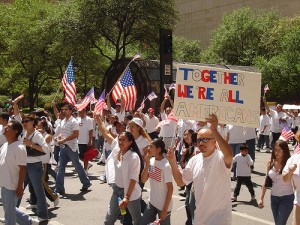The economic downturn has taken a toll on the hopes and expectations of Hispanics in the US with more of them worrying about losing jobs and paying bills than other Hispanics. Those were the findings of a recent Associated Press-Univision poll.
Forty-five percent of those who answered the survey have experienced job loss or had a family member who has done so in recent months.
“The situation is bad now, but I have faith that this is going to change,” says Yadilka Aramboles, a 32-year-old Miamian from the Dominican Republic.
Despite concerns over money, education still tops the list of priorities for Latinos who view it as the ticket to a better future for their children. Many expressed cautious optimism for the next generation with a little more than half expecting their children to have an easier time finding a good job and buying a home.
Eight out of ten respondents say it is important for both girls and boys to graduate high school and go on to college, and ninety-four percent expect that their children will actually attend college.
As in previous surveys, immigrant Hispanics tend to have a more positive outlook than the US born. Immigrants are also far more likely, at 76 percent, to say that their well-being depends on the success of other Latinos. Though, only 29 percent of all those asked believe the US will elect a Latino president in the next 20 years.
The passage of the new anti-immigrant law in Arizona has also had an impact. While English-dominant Latinos tend to be more involved in politics, there is a new “wariness” in this election year where immigration has become a hot button issue.
Prior to SB 1070 being signed into law in April, 39 percent of Latinos who spoke English believed it was important to blend into the larger society; that number jumped to 54 percent in this most recent poll.
The poll interviewed 1,521 Hispanics in English and Spanish, mostly by mail but also by telephone and the Internet. Forty-six percent were born in the U.S. , 32 percent in Mexico, and the rest in the Caribbean islands and Central and South America. Six in 10 are Catholic, about one in seven is Protestant evangelicals. Fewer than one in five immigrants say they arrived in the past 10 years; nearly a quarter have been here at least three decades.
The sponsors and funders of the poll include The Associated Press, Univision Communications, Inc., The Nielsen Company and Stanford University. Stanford University’s participation was made possible by a grant from The Bill & Melinda Gates Foundation.


Interesting poll results. No doubt that education is at the top of my list.